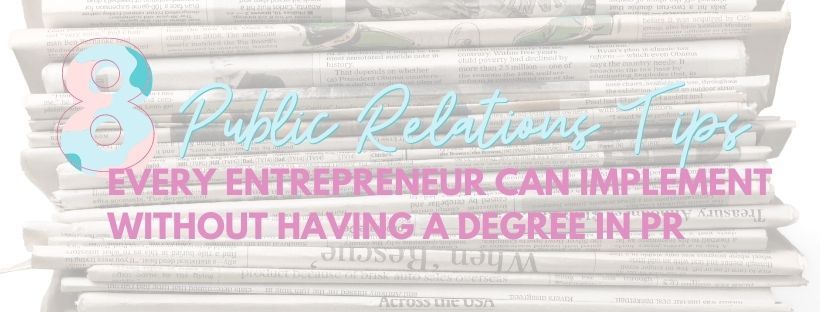Understanding the power of your unique story and media is critical for your business's success. First let’s discuss what Public Relations, also known as PR is, PR is the art of creating and delivering messages that generate publicity for a business. PR helps spread awareness about who you are and what you do, which helps increase sales and drives business growth. Our team of public relations experts has outlined eight PR tips for you to implement into your strategies!

Understanding Your Story
Your first step in PR is to identify the message you want to communicate to the public and understand how to convey that message in the most effective way possible. With a saturated market, you need to dive into what element really sets your story apart. You can pinpoint what message will stand out by asking yourself questions like - Will this story resonate with your target audience? Will your story help you stand out from other news outlets? Does your story correlate with your brand correctly?
Research Your Target Audience
Now, you know your story, but who wants to read it? Well, that is exactly what you need to research in order to get the most out of reaching out to news outlets. Doing research is very time-consuming but every second is worth it for your story to be sent to the correct outlets in order to get worthwhile results. Looking into different news outlets, past stories, their writers, and what their target audience is, is a great place to start your research. Find news outlets that fit what you are looking for - you will have a better chance of getting your story published and read by the correct audience.
Knowing How To Pitch Yourself
Once you have picked your story and done your research, now it's time to pitch yourself. When you are first learning how to perfect your pitch, it can seem like a daunting task, however, effectively pitching yourself is essential for your success. When reaching out to media outlets, remember that they receive many messages from other people wanting story coverage, so you need to stand out and get straight to the point. Understanding what makes your message unique is the exact thing you want to convey in your media pitch because in PR you are selling your story, not a product or service.
Email Etiquette
Writing emails to big media outlets can be intimidating, but remembering proper email etiquette will save you time and allow you to effectively reach out to more people to cover your story. Your email’s subject line should immediately draw the reader's attention, so they are less likely to pass on your message. Think of reaching out to media outlets as a written Elevator Speech, by keeping your intro brief, but loaded with all the important details about your story.
Interview Etiquette
Media interviews are essentially no different from job interviews. There’s still interview etiquette that you should abide by, such as not talking too fast, verbiage, and watching your body language. Focusing too much on interview etiquette can sometimes make you feel unnatural, so practice with mock interviews that way you feel more comfortable. Just like anything else, practicing will help you become better at telling your story to the media.
Communication is Key
It’s important to use a personable, active voice while communicating the main focus of your message. Having a unique selling point in your story is critical to communication, especially with news outlets, so they know what you bring to the table. Whenever talking about your business, you should always come from a place of authenticity, but remember to include any and all the details. Create genuine connections with the new outlets you’re reaching out to because remember at the end of the day, you are selling to people. With effective communication, you can create connections that you never knew were possible.
Longevity of PR
PR is typically done by a trustworthy third party, such as a newspaper or radio, that shares your story. Since those outlets are more trustworthy in the eyes of the consumer, you will generate more organic traffic. 25-40% of lead generation comes from earned media. PR is considered earned media, so you may not pay for PR messages, but you may decide to have a public relations agency do the work for you. However, a PR campaign will have a longer-lasting, positive effect on your brand than an ad campaign. Articles written by news outlets will show up for your brand, via search engines, for a long time and they are viewed as a more credible source.
Credibility
Before your first PR coverage, it is so important to make sure everything of your brand is up to date, that includes your social media, website, and press kit. Since there won’t be any third-party articles about your business yet, those will be viewed as your credibility. An easy way to keep these up to date is, updating as new things come along, whether your follower count increases or you have a new company partner. Don’t wait until right before because you could potentially forget something big which could taint your credibility and your brand.
Now that you got down the PR basics, go out and tell your unique story!










